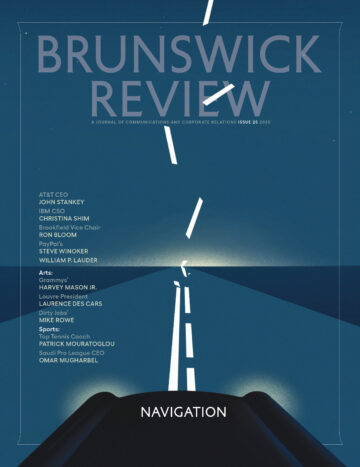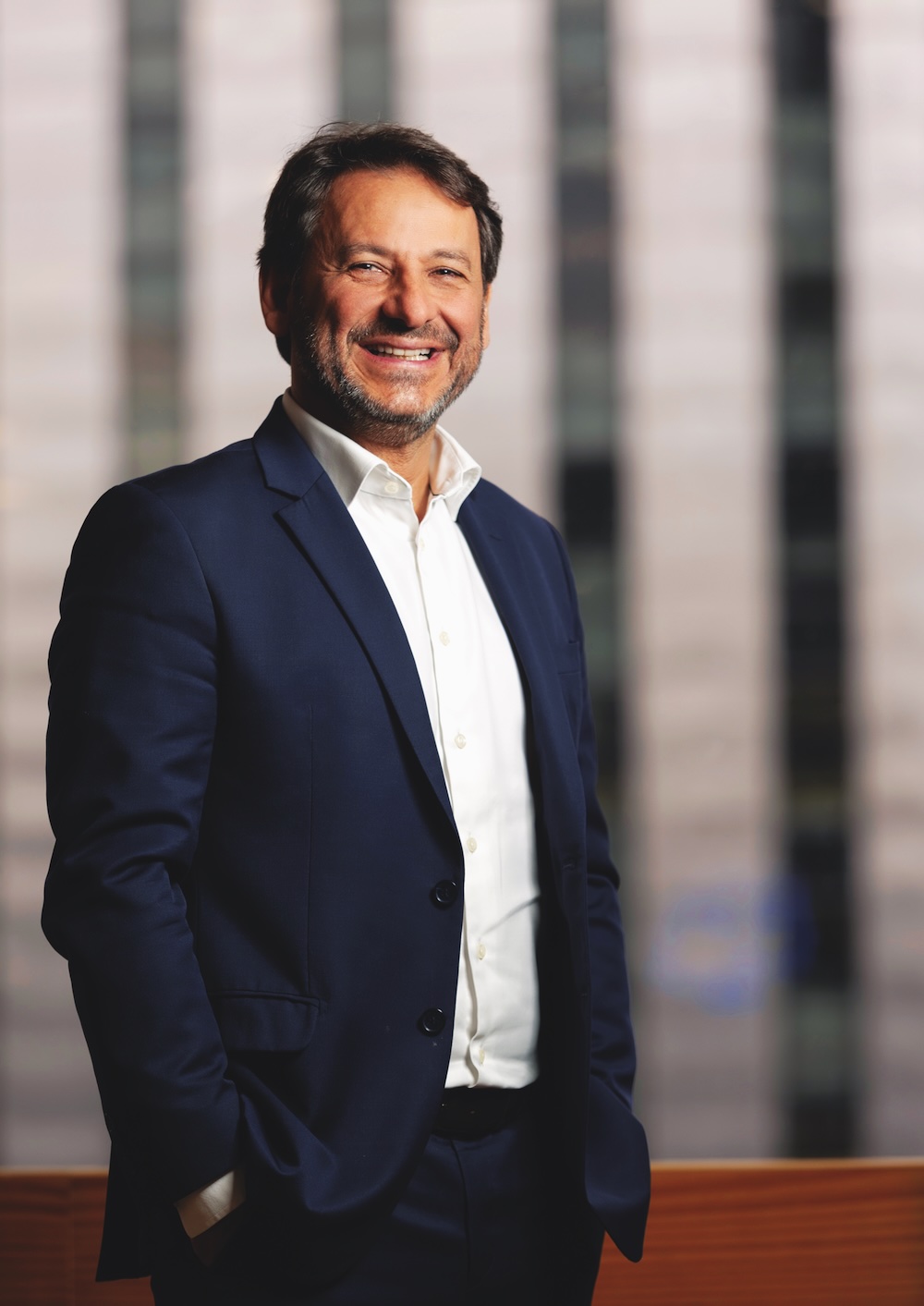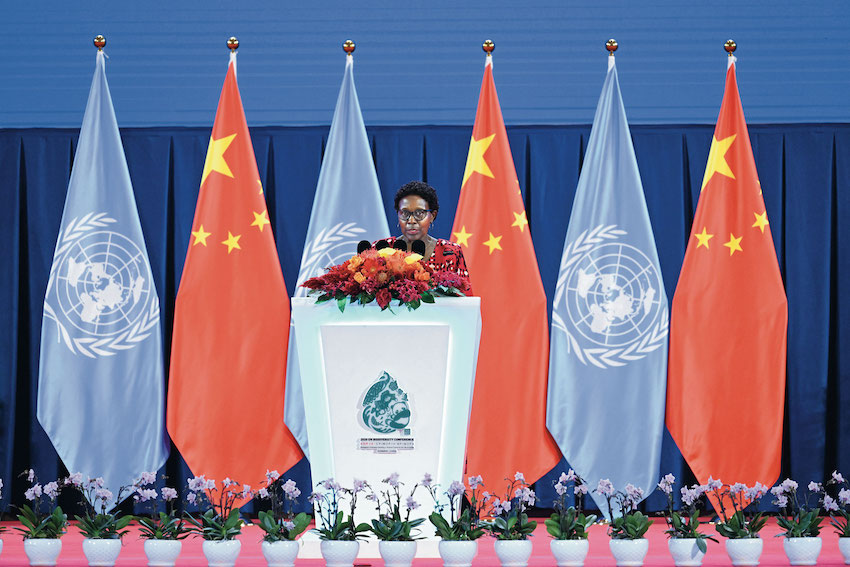Brunswick’s Roberta Lippi and Natasha Bonomi speak to the Brazilian paper company’s CEO about reputation in light of its recent move into global markets.
In June 2025, Suzano—already the world’s largest producer of market pulp and a global benchmark in eucalyptus-based bioproducts—announced the most significant international move in its 101-year history: the acquisition of a 51% stake in Kimberly-Clark’s tissue division outside the United States. Valued at $3.4 billion, the joint venture gives Suzano control over 22 manufacturing and distribution sites across 14 countries, marking its entry into the global consumer goods space, an area where its activity had been previously confined to Brazil. The deal represents the culmination of a carefully designed strategy to elevate Suzano’s leadership in the pulp and paper sector to a new global scale.
At the forefront of this transition is Beto Abreu, Suzano’s CEO since July 2024. With a background that includes leadership roles at Shell, Raízen and Rumo, Abreu brings to the table a leadership style defined by discretion, technical rigor and a strong ethical compass. He is steering Suzano’s global expansion with pragmatic discipline—anchored in financial strength, strategic partnerships and a corporate culture rooted in integrity, coherence, sustainability and operational excellence.
As it breaks into new markets, Abreu knows that reputation will have to be earned through consistency, active listening and concrete delivery. The immediate challenge now lies in unlocking synergies and integrating a global network of nearly 9,000 employees across multiple cultures and regulatory landscapes under a unified governance framework.
Suzano’s future is more than a growth story. In our interview, Abreu sheds light on a model of leadership grounded in coherence—between word and action, between what is planted and what is harvested. Our conversation offers a rare glimpse into how a company from Brazil is redefining what leadership, sustainability and long-term value creation can look like on the world stage.
Let’s begin with the joint venture with Kimberly-Clark, a landmark move for Suzano’s global trajectory. What does this mean for the company?
It’s a move that aligns closely with our long-term strategy, and a partnership that will integrate Suzano’s industrial and operational expertise with Kimberly-Clark’s brand management and international experience across a range of markets. Importantly, we share strong organizational cultures rooted in sustainability and innovation.
We actively pursued this opportunity, in a structure that made sense not only from a strategic standpoint but also in terms of managing risk—always a crucial element when allocating capital. The joint construction was essential and fully aligned with our objective of moving further down the value chain in select verticals where we already operate. From a financial standpoint, the deal stands on its own merits. Strategically, however, it opens up a wide range of new opportunities for the company.
We are very pleased with the move. The next step is to secure regulatory approvals from antitrust authorities and to execute the plan as designed. I would say this is truly a turning point for Suzano’s next phase of international growth.
How do you view that challenge of building your brand reputation in these new markets?
Reputation is built over time—through consistent behavior, clear communication and, above all, coherence between what a company says and what it does. It’s a journey. And as we all know, losing reputation can be dangerously easy.
In today’s hyperconnected world, a company’s image can be damaged—or even dismantled—with alarming speed. Suzano is a century-old business, and I believe our international trajectory must be anchored in the same principles that built our reputation in Brazil: conviction, consistency and integrity.
A very current example is the recent backtracking we’ve seen from some companies regarding their commitments to diversity and inclusion or environmental policies. The question is: Were those commitments ever truly embedded in their values—or were they simply following trends? This type of inconsistency reveals why strong reputations aren’t built on slogans or marketing campaigns. They’re forged through sustained, long-term action.
“Strong reputations aren’t built on slogans or marketing campaigns. They’re forged through sustained, long-term action.”
Brazil’s reputation is still often tied to deforestation and environmental irresponsibility—the pulp and paper sector is frequently, if unfairly, included in that narrative. Can Suzano help reshape this perception?
Absolutely. It’s part of our responsibility to help change that narrative. Brazil actually has one of the most rigorous environmental policies in the world—even more so than many OECD countries.
At Suzano, we manage 2.8 million hectares of land. Of that, 40% is native vegetation preserved under our care. This is a characteristic of our business model and regulation in Brazil, where we produce pulp while preserving a big proportion of native forest. It doesn’t exist elsewhere. In some countries widely viewed as a benchmark in sustainability, pulp is still made from native forests. We harvest only planted eucalyptus.
So the negative perception of Brazil often goes far beyond the actual practices of Brazilian companies. We are in the middle of a global trade and geopolitical dispute—one where environmental issues are being used as leverage. These narratives can occasionally be shaped by differing economic interests. That’s the reality we’re facing.
Given that context, what do you see as the main challenges in telling Suzano’s story to these new markets?
We need to tell our story with consistency and credibility. That means presenting what we do with verified data and proven practices. For example, we understand that our industrial and logistics operations have greenhouse gas impact as other industries have, but in the forest operation we are removing more carbon from the atmosphere than emitting.
In our expansion plan executed through sustainable management, we are planting 1.2 million trees every day, in areas that were previously degraded. Not a thousand. Not a hundred thousand. One-point-two million trees daily, growing and absorbing carbon side by side with important native trees on our conserved areas.
This cycle continues with black liquor, a natural byproduct of wood, which we use to fuel our plants. Our technology allows us to harness this byproduct to generate 100% renewable energy. A clear model of circularity.
We treat and return the water we use and we generate our own renewable energy, even exporting clean energy back to the grid—since we produce more than we consume. Our newest mill in Mato Grosso do Sul alone generates enough electricity to power all residential homes in the state. And any supplier connected to our operations receives renewable energy from Suzano.
But sustainability is not just about the environment. Caring for local communities is central to our business model. Last year, through externally audited initiatives, we helped lift 50,000 people out of poverty. Our goal is to reach 200,000 by the end of 2030. These are numbers we’re proud of—because they represent lives changed. We also see it as our duty to contribute to Brazil’s broader development—not only economically, but culturally. We want to shift the mindset from dependence to autonomy. That’s part of our company’s purpose.
Our 25,000 direct employees—and 25,000 more contractors—share that vision. When asked if they would recommend Suzano as a great place to work, the majority say yes. It’s not just about salary or job structure. It’s about purpose, identification and impact. We have the data. We have the results. The challenge is how we tell that story in the right way. Not to seek praise, but to inspire others, attract new partners and amplify our impact.
Today, for example, we have suppliers and clients actively participating in our biodiversity plan, which aims to connect 500,000 hectares of fragmented habitats in the biomes where we operate—Atlantic Forest, Amazon and Cerrado. Preserving them is not enough—we want to create ecological corridors that allow biodiversity to roam freely. Companies are investing alongside us in this project. That’s the power of a well-told story: The more people you engage, the greater the impact.
From Suzano’s century-long journey in Brazil, what do you think the company’s most meaningful contribution can be to international markets?
The first thing we need to bring with us when stepping outside our comfort zone is humility—the awareness that we still have a lot to learn. That, I believe, is the most important value we’re taking with us as we enter these new countries. It’s critical to respect the geography and culture of the places where we operate.
We must avoid the assumption that we always have the best solutions for everything, everywhere. But we are also bringing some core principles of our culture that we believe are universally applicable.
First and foremost is safety. We will operate 22 facilities across various countries, and we have a clear safety standard—a deep commitment to the physical well-being of our people.
Another core value is compliance. We want to do things the right way.
And a third element, undoubtedly central to our culture, is our management model. It’s built on optimization, efficiency, productivity and performance. A company needs to be well managed to have the oxygen to grow, to continue expanding and to positively influence its broader ecosystem.
“I never want to lose the ability—or the right—to be outraged by what’s wrong. That, to me, is non-negotiable: staying ethical, acting with integrity. It’s as simple as that.”
Looking to the medium and long term, what is Suzano’s international ambition?
In the short term, we’re focused on making sure the joint venture unfolds exactly as planned. That takes time, two or three years, during which we do not expect further inorganic movements.
Right now, our full attention is on maintaining efficiency and productivity in our Brazilian operations, while ensuring this new front is successfully integrated and hits the performance targets we’ve established—particularly regarding operational gains—as quickly as possible.
Longer term, our ambition is to become a relevant global player in the verticals we’ve chosen to pursue, both organically and inorganically. We made a decision to enter the tissue segment, and to expand in packaging, especially paper for packaging—our first move in the US. We’re also entering the textile market, through our investment in Austria, with Lenzing. And, of course, we remain firmly committed to pulp—where we’re already a global leader—and to the eucalyptus fluff pulp segment.
That’s the roadmap. But we want to move forward with precision—strategic, high-return moves that create value for shareholders, always with risk-mitigating structures. And it doesn’t mean only buying equity, but being creative to design business models and pursue growth opportunities through partnerships.
With COP30 on the horizon and the world’s eyes turning to Brazil as its host country, what are your expectations for the summit? And how does Suzano, recognized for its sustainability standards, plan to contribute at such a pivotal moment?
At Suzano, we’ve consistently participated in every COP with clear goals and long-term vision. But we don’t believe in waiting for a COP to act or to communicate our sustainability agenda. Yes, it’s a critical moment, but it’s part of a much broader journey.
Our work is year-round. We engage with multiple stakeholders, certification bodies, industry forums—and, above all, we focus on concrete proposals aimed at mitigating climate change.
This COP will focus on the action agenda, and together with the Brazilian forestry sector, we have made significant contributions through a sustainable production model and various initiatives that directly address this agenda—always in a collaborative manner with the different stakeholders of the COP ecosystem.
Ultimately, the goal is to contain global warming and prevent the temperature from rising 1.5 °C by 2050. That’s why we’ve set clear targets for all emission scopes. I often say that if every company handles Scopes 1 and 2—their direct operations—Scope 3 will take care of itself, because one company’s Scope 3 is another’s Scope 1 or 2.
At Suzano, we are committed to halving our Scope 1 and 2 emissions by 2032. Beyond that, we are actively removing carbon from the atmostphere through our forest operations. We are also engaging with SBTi, following the discussions around article 6.4 of the Paris Agreement and the new Brazilian carbon market to ensure these removals are recognized as a serious, traceable asset that guarantees carbon permanence in nature—eligible for inclusion in compensation strategies by both Suzano and its partners.
Suzano’s role at COP30 will be to demonstrate that progress is possible. We’ll share our journey and present concrete, scalable proposals to inspire other companies and sectors. The summit plays an important role in keeping the conversation alive, but real progress doesn’t happen in two weeks—it takes consistent work, 365 days a year.
You’re known for your discreet, thoughtful leadership style. How would you describe your approach to leading people?
First, I don’t believe any one person has all the answers. To me, leadership is about creating an open environment for dialogue—where agreement and disagreement can coexist naturally. I rarely go into a conversation with a fixed answer. I prefer to listen, ask the right questions and build stronger solutions as a team.
I also focus heavily on long-term strategy. I see real risk in decision making that’s guided solely by short-term gains. So I try to strike a balance between the urgent, the tactical and the strategic—so we invest our energy in what truly matters.
And I believe in doing fewer things—but doing them with intensity. With a beginning, middle and end. In large companies, there’s always the temptation to try to do it all. But in a world where most people are focused on launching new initiatives, I try to be the counterbalance—constantly questioning what we should stop doing, what should be dismantled or discontinued. Because sometimes, choosing to stop is the most strategic choice.
What’s non-negotiable for you?
Conduct, respect, integrity. Always doing what’s right. I never want to lose the ability—or the right—to be outraged by what’s wrong. That, to me, is non-negotiable: staying ethical, acting with integrity. It’s as simple as that.
More from this issue

Navigation
Most read from this issue

The Natural Resource Chasers






